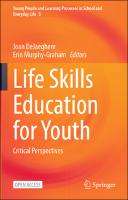Life Skills Education for Youth
Critical Perspectives
| dc.contributor.editor | DeJaeghere, Joan | |
| dc.contributor.editor | Murphy-Graham, Erin | |
| dc.date.accessioned | 2021-12-13T18:55:41Z | |
| dc.date.available | 2021-12-13T18:55:41Z | |
| dc.date.issued | 2022 | |
| dc.identifier | ONIX_20211213_9783030852146_28 | |
| dc.identifier | OCN: 1286948160 | |
| dc.identifier.uri | https://library.oapen.org/handle/20.500.12657/51950 | |
| dc.description.abstract | This open access volume critically reviews a diverse body of scholarship and practice that informs the conceptualization, curriculum, teaching and measurement of life skills in education settings around the world. It discusses life skills as they are implemented in schools and non-formal education, providing both qualitative and quantitative evidence of when, with whom, and how life skills do or do not impact young women’s and men’s lives in various contexts. Specifically, it examines the nature and importance of life skills, and how they are taught. It looks at the synergies and differences between life skills educational programmes and the way in which they promote social and emotional learning, vocational/employment education, and health and sexuality education. Finally, it explores how life skills may be better incorporated into education and how such education can address structures and relations of power to help youth achieve desired future outcomes, and goals set out in the Sustainable Development Goals (SDGs). Life skills education has gained considerable attention by education policymakers, researchers and educators as being the sine qua non for later achievements in life. It is nearly ubiquitous in global and national education policies, including the SDGs, because life skills are regarded as essential for a diverse set of purposes: reducing poverty, achieving gender equality, promoting economic growth, addressing climate change, fostering peace and global citizenship, and creating sustainable and healthy communities. Yet, to achieve these broad goals, questions persist as to which life skills are important, who needs to learn them, how they can be taught, and how they are best measured. This book addresses these questions. | |
| dc.language | English | |
| dc.relation.ispartofseries | Young People and Learning Processes in School and Everyday Life | |
| dc.subject.classification | thema EDItEUR::J Society and Social Sciences::JN Education::JNZ Study and learning skills: general | en_US |
| dc.subject.classification | thema EDItEUR::J Society and Social Sciences::JN Education::JNR Careers guidance | en_US |
| dc.subject.classification | thema EDItEUR::J Society and Social Sciences::JN Education::JNL Schools and pre-schools | en_US |
| dc.subject.classification | thema EDItEUR::J Society and Social Sciences::JN Education::JND Educational systems and structures::JNDG Curriculum planning and development | en_US |
| dc.subject.classification | thema EDItEUR::J Society and Social Sciences::JB Society and culture: general::JBF Social and ethical issues | en_US |
| dc.subject.classification | thema EDItEUR::J Society and Social Sciences::JM Psychology::JMS Psychology: the self, ego, identity, personality | en_US |
| dc.subject.other | examining life skills education scholarships | |
| dc.subject.other | life skills for adolescents in developing countries | |
| dc.subject.other | linking life skills education and social-emotional learning | |
| dc.subject.other | life skills for 'at risk' youth | |
| dc.subject.other | social justice based approach to life skills | |
| dc.subject.other | empirical cases of life skills education | |
| dc.subject.other | employability and soft skills curriculum development | |
| dc.subject.other | career skills as education | |
| dc.subject.other | Open Access | |
| dc.title | Life Skills Education for Youth | |
| dc.title.alternative | Critical Perspectives | |
| dc.type | book | |
| oapen.identifier.doi | 10.1007/978-3-030-85214-6 | |
| oapen.relation.isPublishedBy | 6c6992af-b843-4f46-859c-f6e9998e40d5 | |
| oapen.relation.isFundedBy | 1edf7275-d11e-45ad-a038-9270d4ffa2e0 | |
| oapen.relation.isbn | 9783030852146 | |
| oapen.imprint | Springer International Publishing | |
| oapen.series.number | 5 | |
| oapen.pages | 276 | |
| oapen.place.publication | Bern | |
| oapen.grant.number | [grantnumber unknown] |

